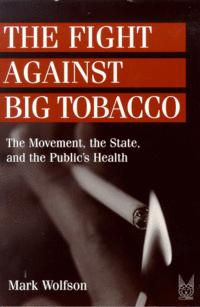

![]()
![]()

There has been something of a major boom in the anti-smoking camp since the US courts started awarding claims against the multinational tobacco companies. In 1994 a unique suit was filed against the tobacco industry. This case was different from previous ones in that it was brought by two of the largest purchasers of health care in Minnesota, and not by individuals. In addition, "the case was of tremendous size and scope compared to past suits" (page 111). The tobacco industry settled the suit in 1998, agreeing to new restrictions on marketing and a financial settlement of nearly $500 paid over a five-year period million to the health care providers and $6.1 billion paid over 25 years to the state.
Sociologist Mark Wolfson used Minnesota (USA) as the case-study approach in his study of a relatively successful anti-tobacco movement. Wolfson used a variety of methods, including participant observation, face-to-face interviews and a stratified random survey of individuals affiliated with organisations involved in organised tobacco control advocacy. The book shows that the anti-tobacco movement had intended as well as unintended consequences. This book is a volume in the series Social Problems and Social Issues with Joel Best as series editor.
The book gives the outsider a sense of history of the movement, its main strategies, and it internal and external policies. It gives background information on the main organisations in the arena. It reminds us of the power of the tobacco multinationals, both directly and indirectly (though politicians). Wolfson's quotes of his informants give the reader a real sense of the tobacco companies' influence. In one instance a bill passed unanimously one year, did not get a single vote the following year. The informant is quoted as:
And after it was over I went to the chair and I said, 'I know what has happened here. I know that it was arranged ahead of time...and it stinks and I'm not going to be quiet about it.' And he said, 'I'm really sorry about this.. The word came from the leadership that this bill was never going to come out of committee..."In terms of social movement theory Wolfson addresses two streams: (1) mobilising structures; and (2) relationships between the state and the movement. The book highlights the importance of social 'infrastructure' on which movements are built (page 185).
Three points of criticism can be raised against this book. First, a minor criticism, it needs a list of abbreviations. The index is good and helps the reader as it lists the full name for most of the many abbreviations. Secondly, the book would have benefited from a descriptive section on Minnesota, and general workings of social movements in the USA. As Minnesota is taken as a case-study, it would have helped the non-American reader to know the some more background of the state and the people of Minnesota, and the working, funding, legislation, etc. concerning pressure groups. For example, the reader is left to guess what is meant exactly by '501(c)(3) nonprofit organizations'. The North-American reader could skip it, but for an overseas' audience it is necessary information which is vital to understand the case better. Thirdly, there are a few minor repetitions here and there.
Overall, the book is a real labour of love, with a clear theoretical backbone and a large amount of details. The book will appeal to researchers and students in medical sociology, public health, health promotion, contemporary social history and health and social policy, especially in the area of social movements/pressure group politics.
Edwin van Teijlingen
Medical School, Aberdeen